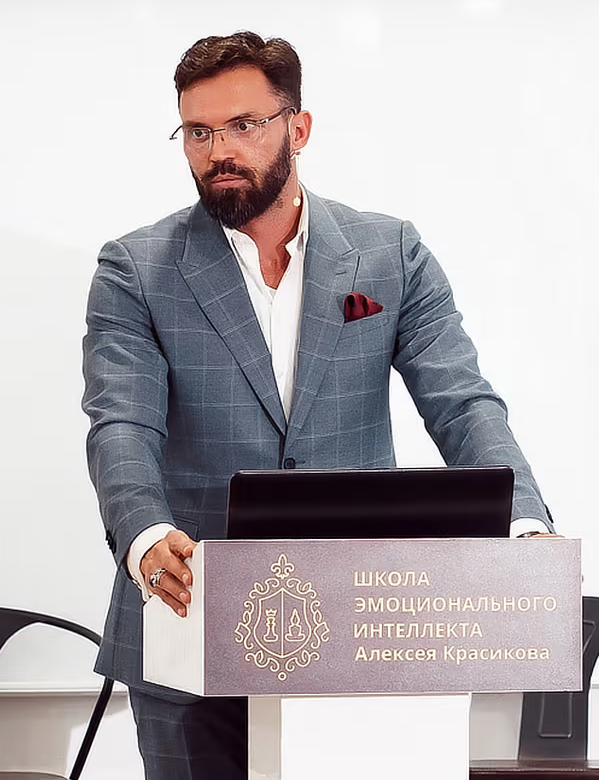
Основатель «Школы Эмоционального Интеллекта и Психотерапии»,
Преподаватель МГУ Основатель "ШЭИ",
Преподаватель МГУ
Преподаватель МГУ Основатель "ШЭИ",
Преподаватель МГУ
Наши партнеры

Home - Program
Program

Block #1 Physiology of the CNS and visceral systems of the organism
In this block 3 modules will be considered: the module of the nervous system, psychophysiology and visceral systems of the organism.
Lecturer of the block: Vladimir Merkuryev
Students will get the basics of the structure of the nervous tissue, the central and peripheral nervous system, will have knowledge from the history of study to the levels of organization of the organism. Each student will receive a detailed explanation of the physiology of stress, emotion, and the psychophysiological foundations that are necessary in the practice of the counseling psychologist.
For your perusal, below are some of the topics of the lectures from the curriculum:
1. History of the study of the workings of the nervous system. Levels of organization of the body.
2. Structure and function of nervous tissue. Resting potential and action of the nerve cell. Synapses.
3. Chemical organization of the brain.
4. Reflex. Classification of reflexes. The reflex principle of regulation of the body's work.
5. The concept of innate nervous system. The concept of dominance. Higher mental functions (consciousness, memory, thinking, speech, emotions).
6. Stress and its mechanisms of occurrence. Development of stress according to Anokhin.
The endocrine system. Types and mechanism of action of hormones. Basic disorders of the endocrine system.
8. Cardiovascular system. The main diseases. Mechanism of development of disorders of the cardiovascular system under the influence of stress.
Emotions: classification of emotions. Primary and secondary emotions. Centers of emotional reactions in the structures of the limbic system. Neurochemistry of emotional reactions.
10. The brain and decision making. Free will.
11. Psychophysiology of needs. P. Simonov's theory.
Leave a request for training
Block #2 Psychiatry for the Consulting Psychologist
In this block our students will learn the basics of psychiatry, which are necessary in the practice of the counseling psychologist. In addition to diagnostic methods, what are the concepts and methods of correction of psychopathology, much emphasis is placed on differential diagnosis. It is important to us that our graduates know how to interact with a psychiatrist and know when pharmacotherapy is necessary.
Lecturer of the block: Maria Temirova
For your reference, here are some topics of lectures from the curriculum:
1. Introduction to the course, peculiarities of psychiatry, problematics. General and private psychopathology
2. Schizophrenia, flaccid schizophrenia, other psychotic disorders. Bipolar affective disorder. Depression
3. Generalized anxiety disorder and panic disorder
4. Obsessive-compulsive disorder. Somatoform disorders
5. Post Traumatic Stress Disorder (PTSD). Eating disorders (anorexia, bulimia, compulsive overeating)
6. Personality disorders. Psychopharmacology
7. Non-drug therapies, psychotherapy
Leave a request for training
Block #3 Physiology of functional body systems
This block will cover seven disciplines: Cardiology. Neurology. Gastroenterology. Hematology. Pulmonology. Endocrinology. Somnology.
There are clients who think they are about to die because of a stroke or cardiac arrest. Often it turns out that this is just a manifestation of a panic attack and the problem can be resolved with psychotherapy. And there are times when a person complains that it is difficult for him or her to get up in the morning, he or she feels a loss of energy and exercise does not bring him or her pleasure. The client may think that he has depression, but in fact it turns out that he is facing a true organic pathology. If the problem is not recognized in time and the person is not sent to a doctor, he could die.
The problem is that today many doctors treat panic attacks with pills and psychologists treat iron deficiency anemia with talk. In this block, experienced doctors will teach you how to distinguish between manifestations of anxiety-phobic disorders and real health problems. You will be able to detect the problem in time and help the person by sending him or her to the right doctor for an examination.
Block instructors: Azamat Baimukanov. Natalya Trofimovskaya. Lyudmila Legostaeva. Natalia Dorokhova (List of teachers)
Students will receive the basics of the structure of nervous tissue, the central and peripheral nervous system. Will possess knowledge from the history of study, to the levels of organization of the organism. Each student, will receive a detailed explanation of the physiology of stress, emotion, and the psychophysiological foundations that are necessary in the practice of the counseling psychologist.
For your perusal, here are some of the topics of the lectures from the curriculum:
1. Irritable bowel syndrome: Relevance. Etiology and pathogenesis. Classification. Clinical picture. Methods of diagnostics. Complications. Differential diagnosis with anxiety-phobic disorder.
2. Correction of anxiety disorders in patients with cardiac rhythm disturbances.
3. Algorithm "Differential diagnosis of cardiophobia".
4. Functional diagnosis and clinical manifestations of anemia and iron problems. How low iron can affect the client's emotional background.
5. Climax. estradiol. Testosterone. Functional diagnosis and clinical manifestations of sex hormone imbalances.
6. Sleep physiology. Insomnia. Causes of insomnia and methods of correction.
7. Algorithm "Correction of chronic insomnia".
Leave a request for training
Block #4 Basic psychotherapeutic approaches
This block consists of 2 modules: Personality-oriented (reconstructive) psychotherapy and cognitive-behavioral psychotherapy.
Block instructors: Sergei Podsadnyj (Personality-oriented reconstructive psychotherapy), Pavel Plyasov (CBT, Cognitive behavioral therapy)
For your perusal, here are some topics of lectures from the curriculum:
1. Introduction to Personality-oriented reconstructive psychotherapy.
2. Development of relational psychology according to V. Myasischev.
3. the science of character. Relational theory.
4. definition, structure and dynamics of personality development.
5. The definition of personality as a system of a person's attitude toward reality.
6. The structural components of personality.
7. Development of personality in the course of a person's life.
8. Essence characteristics, components and system properties of relations.
9. The pathogenetic concept of neurotic disorders.
10. The main technical techniques of individual personality-oriented reconstructive psychotherapy
1. Introduction to cognitive-behavioral psychotherapy. 2. Fundamentals of CBT philosophy.
3. automatic thoughts.
4. Deeper beliefs.
5. SMER (a Russian adaptation of the ABC model, the theory of Albert Ellis that underlies cognitive-behavioral therapy).
6. Compensatory behavior.
7. Dispute.
8. Conceptualization.
9. Behavioral experiments.
10. Psychotherapy in practice.
Leave a request for training
Block #5 Philosophy as a tool for psychological counseling
In this block, students will learn:
- Why philosophy is so important in the practice of psychology
- How philosophy helps one to deal with anxiety
- The philosophy of Stoicism as the basis for cognitive-behavioral psychotherapy
- Basic working tools of ancient philosophy for the practice of psychologist.
Leave a request for training
Block #6 Practical application of psychotherapeutic approaches and specific features of consulting clients with anxiety disorders
Block lecturer: Alexey Krasikov
This block is led by the founder of the School of Emotional Intelligence and Psychotherapy Alexey Krasikov. In this training block, our students combine all the knowledge obtained above.
Some of the topics of the curriculum for this block:
1. Primary consultation. The collection of anamnesis.
2. Formation of basic and secondary inquiries.
3. Hypothesis building.
4. informing the patient about his/her condition.
5. Practical exercises in dealing with symptoms.
6. Monitoring of the exercises. Coaching.
7. Change of request to work with the causes.
8. Building a pathogenesis.
9. Integration of Emotional Intelligence in the reconstruction of the relationship system.
10. Formation of flexible alternatives, adaptation and prevention.
11. Prevention of relapses (PA, anxiety, neurosis).
Leave a request for training








